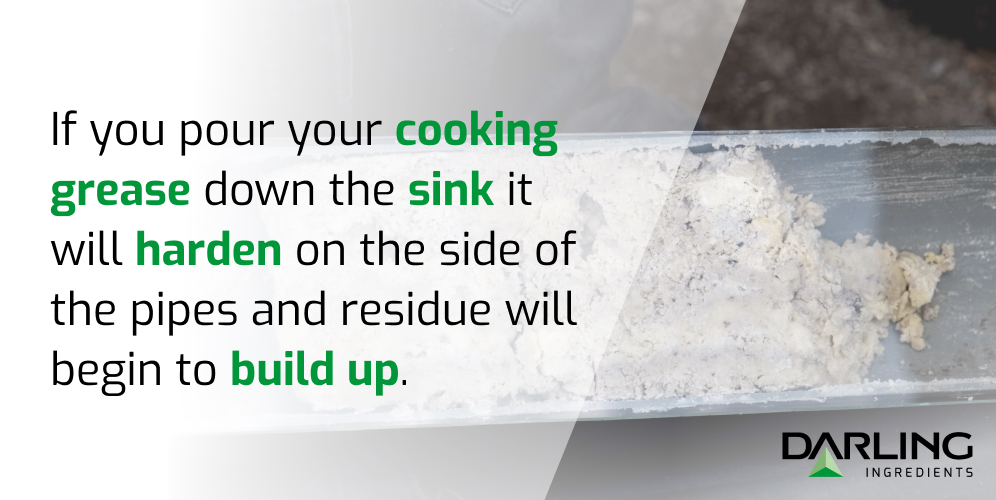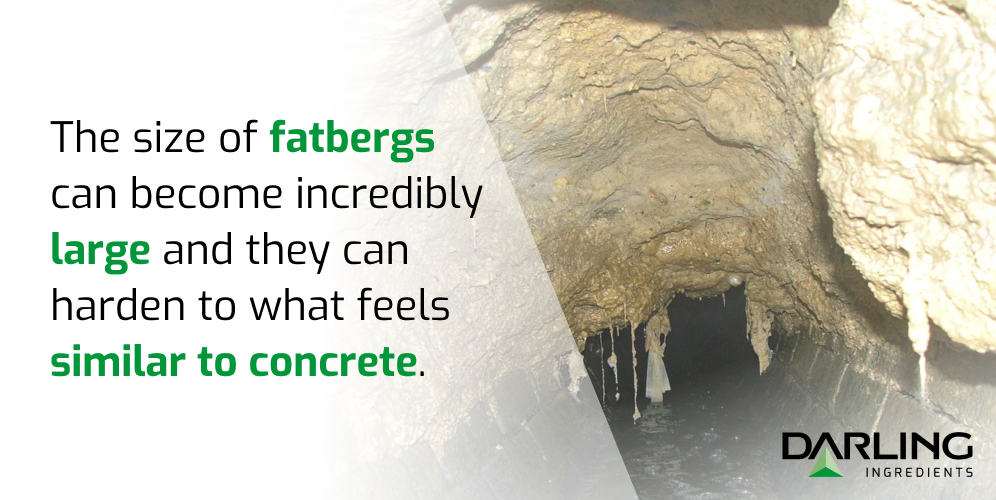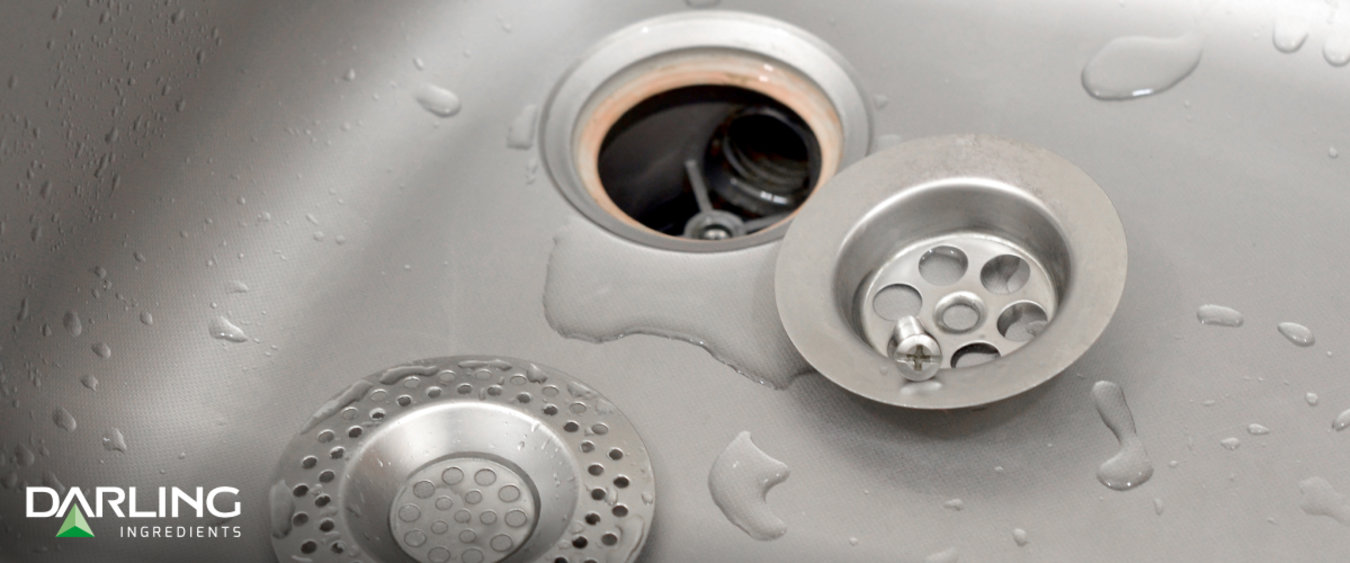1. Grease May Harden When it Cools
It is easy to think of hot restaurant cooking oil just as you think of water when disposing of it, because they might look the same in the liquid state, but that oil may not remain in liquid form. Think about grease spilled on a table that does not get cleaned up immediately. With time, it hardens into a solid form. When it cools down, some types of will grease hardens. If you pour your cooking grease down the sink it will harden on the side of the pipes and residue will begin to build up. Residue and grease collection on the walls of the pipes will eventually clog the pipe, just like any other plumbing issue would.
Another issue with this is that you and your staff will likely remain blissfully unaware of this budding build up until it becomes a full blown problem. Pieces of food debris (and whatever else goes down your drain) will get caught as well as the oil begins to build up within the pipes. With time this will lead to a blockage and many other expensive and messy problems to fix. Additionally, with all the used cooking oil getting into the trap, you will need your grease trap servicer to pump more frequently, causing an increase in fees.
Some may think they can get around this problem using water to rinse out the used cooking oil that goes down the drain, but that will not do the trick. Neither water nor soap, no matter how hot or how much, will help the grease slide through the pipes and prevent it from hardening and eventually creating a blockage.
Plus, whatever grease does slip through the drainage system is not good for the environment and will not end up in a better place. In fact, it will likely become a bigger, more expensive problem.

2. Into the Sewage System it Goes
Even if some grease gets through your pipes without hardening, it will often become a bigger, more serious problem in the sewer system. Sewer systems are already full of an abundance of gunk such as chemicals from cleaner, oxidized pipe systems, and a variety of other decomposing waste. It becomes a larger problem when you add grease into that mix. The mixing of the chemicals and the grease when they come into contact with each other can lead to a reaction and potentially form a new waxy, soapy substance that enlarges and gets sticky referred to as a fatberg.
What are Fatbergs, and Why Should You Be Worried About Them?
Inevitably, some nonbiological waste makes its way down the drain and into the sewage system, when oil and grease is poured down too it can accumulate and congeal around the flushed waste forming what is known as a fatberg. Imagine it as a grease bubble that quickly turns into a growing snowball when in contact with chemicals and other
The size of fatbergs can become incredibly large and they can harden to what feels similar to concrete. According to some estimates, fatbergs can grow to more than 800 feet long and weigh up to 100 tons. It can become a serious issue for city sewer systems once a fatberg forms and enlarges. It may be hard to imagine something that size forming simply from cooking oil being poured down the sink, but it happens. New York City spends nearly $4 million dollars a year clearing out fatbergs. Ask yourself, is it really worth it pouring grease down the drain?

3. Damage to Your Wallet and the Environment
When your municipality’s sewage system has a fatberg or other grease-related problem, they may be able to trace it back to your restaurant pouring grease down the drain. If this is the case, you will be required to pay your local municipality a costly fine. In the city of Toronto, a premise that causes a Municipal sewer blockage may be charged back for the cost of sewer repair, in addition to any other remedies or enforcement. Convictions for contraventions of Chapter 681 – Sewers can range up to $75,000 for an individual and up to $100,000 for a corporation.
Harm to the environment is no joke either. The environment can be affected by deposits of garbage and raw sewage from sewer floods and backwashes that are toxic to plants and wildlife, and damages the local environment. When grease is poured down the drain, nothing and no one wins. What might appear as a quick and easy way of discarding waste has no upside and will only cause your business problems in the long run.
So, what can you do with it?
Recycle Your Used Cooking Oil
When it comes to the disposal of used cooking oil, using a reputable recycling partner to recycle it is always the best option. It will improve your bottom line and the health of the environment in the future and act as a preventative measure in regards to plumbing issues.
When you place it in the right hands, that grease you think is nothing but waste and are tempted to pour down the drain, has value to it. A reputable service provider will pay a market-based rebate for your used cooking oil and provide regular service to your business. When you let cooking oil flow down the drain, you let money flow down the drain. Some grease recycling companies can use your used cooking oil into ingredients used to produce renewable diesel, an alternative to petroleum that burns cleaner and helps curb carbon emissions. Just as it is a lose-lose when oil gets poured down the sink, recycling used cooking oil is a win-win.
There is a lot you can do wrong with used cooking oil, and a lot you can do right. Ensure that your business and staff is safely and responsibly disposing of your frying oil. Handling it properly will ensure you are able to get consistent value out of a commodity that fries you delicious food and will improve your bottom line.
Darling Ingredients provides services to businesses across the country when it comes to used cooking oil recycling. We have an industry leading selection of equipment and an automated pick up schedule that makes the transfer process easy. Reach out to a Darling Ingredients representative today to find out more about our program and how your business can benefit. Call us 27/7/365 at 800-263-0203.
Contact Sales
For customer service inquiries call our toll free number (800) 263-0302
By submitting this form I agree to the privacy policy including the usage of contact details to contact me for marketing purposes.
